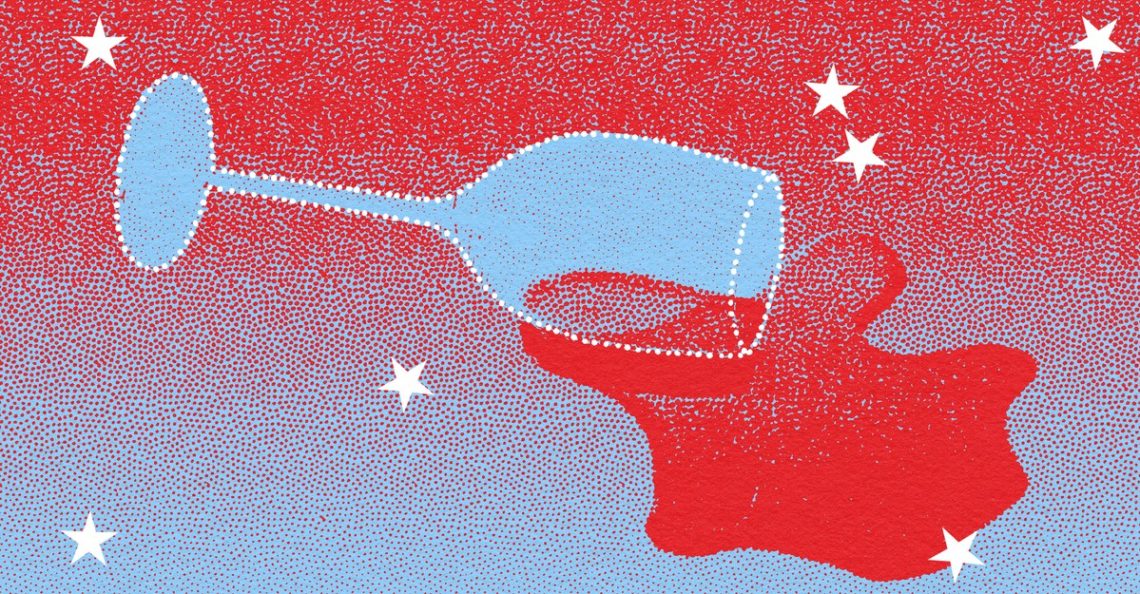One minor but arresting fact of U.S. history is the huge amount of alcohol the average American consumed in 1830: 7.1 undiluted gallons a year, the equivalent of four shots of 80-proof whiskey every day. Assuming some children wimped out after the first drink, this statistic suggests that large numbers of Jacksonian-era adults were rolling eight belts deep seven days a week, with all the attendant implications for social and political life. Imagine what it was like resolving a buggy accident, let alone conducting a presidential election.
Much has been said about Americans’ supposed national virtues—the mercantile ambition, the Protestant work ethic, the rugged individualism—and the particular character they lend the United States, but comparatively little has been said about national vices. Give your 19th-century plowman a dozen hard ciders, though, and see whether that plays a more significant role in his evening than his urge to pull himself up by his bootstraps. Just as personal vices can shape the course of an individual life, so too can national vices influence our collective experience, maybe as much as our virtues—or possibly even more. And those vices are changing.
Compared with our forebears, Americans barely drink now: a mere 2.5 gallons per capita in 2022. The more striking change, though, is that in a Gallup poll released in August, only 54 percent of respondents said they drank at all—the lowest portion since the analytics company started asking the question in 1939. Although doctors surely approve, this downturn is bad news for those of us who use alcohol for its intended purpose—improving the company of others—to say nothing of its off-label uses in dancing, youth-sports spectating, karaoke, etc.
The decline in drinking coincides with a decline in social activity more broadly. A variety of causes have been blamed for this trend toward isolation, phones chief among them. Maybe the phone theory is correct, and maybe it is not; the forces behind broad national trends are endlessly debatable. At the micro level, however, the influences of different vices become more clear. Consider a night out with friends, and the diverging consequences of buying a round of shots versus opening up Instagram.
The systemic effects of millions more people looking at their phones and millions fewer getting drunk remain to be seen. These are not the only changing national vices, however; more Americans are also gambling online, consuming marijuana, and watching pornography than ever before. And these new, ascendant vices are likely to shape American life in the 21st century as much as mass day drinking shaped life in the 19th.
Nearly half of U.S. states have legalized recreational marijuana since 2012, a change that seems to be causing a massive rise in the number of Americans who use cannabis. Although evidence does not indicate how many people who have given up booze are taking up weed, the percentage of Americans ages 19 to 30 who reported consuming marijuana within the past year went up by 56 percent from 2009 to 2023, according to a University of Michigan report. The increase was even higher in the 35-to-50 cohort, whose portion of marijuana users more than doubled during the same period. These statistics do not include use by minors, which my own unscientific observations suggest has increased approximately one million percent since recreational marijuana became legal in my town in 2023.
Again, these numbers don’t mean that Americans are turning to marijuana instead of alcohol. But marijuana consumption has gone up at the same time that alcohol consumption has gone down, and the qualitative differences between being high and being drunk translate to differences in social behavior. For instance, alcohol can legally be consumed in bars, where one often meets and even talks to other people; meanwhile many states that have legalized recreational marijuana prohibit its use where it is sold, forcing the purchaser to take an additional step in order to get high in company. People can still get high together, obviously, but people who drink in bars are more likely to find themselves socializing whether they mean to or not. Customs surrounding the two drugs differ meaningfully, too. Drinking alone on a regular basis is widely stigmatized as a symptom of alcoholism; the stigma against getting high alone, maybe while you listen to your vinyl copy of G N’ R Lies and look for that goat you saw in the wood paneling one time, is anecdotally weaker.
Is the confluence of decreasing interest in alcohol and increasing interest in marijuana making Americans socialize less? The question cannot responsibly be answered with any certainty, even if one feels that incidents of people getting riled up and burning down the mill owner’s house have gone way down since 1830.
But what is the national character if not a vague feeling? My feeling is that our vices have become more furtive and alone. Consider the massive rise in the most depressing vice I can think of: online gambling. A poll by the Siena College Research Institute found that 48 percent of men ages 18 to 49 have an account with an online sportsbook, an astonishing number that probably has something to do with 39 states having legalized sports betting since 2018. Whereas other forms of gaming require people to sit around the same table, crouch in the same alley, or gather at the same racetrack, online-sportsbook users can gamble in total isolation. Say what you will about gambling’s ruinous effects on fortune and family—at least it has historically brought people together. The poker craze of the aughts, for example, created untold numbers of problem gamblers; it also led them to sit with one another for hours at a time. The difference between millions of Americans trying to read one another’s facial expressions while they reinforce compulsive behavior and millions hunching over their phones to incur a similar risk is not negligible.
Perhaps the phrase hunching over their phones is better applied, though, to another, lonelier 21st-century vice: internet pornography. Some people watch porn together, of course, but one can reasonably assume that most porn is consumed alone. And although erotic images have existed since the dawn of visual representation, internet video pornography and the multibillion-dollar industry that has developed around it make porn at once more available and more potentially time-consuming than ever before. A single DVD or issue of Penthouse gets old; the supply of free porn on the web is bottomless.
People of different moral persuasions have different perspectives on what constitutes sexual vice and how serious a problem it presents, but at least the analog sexual behaviors that are often frowned upon, such as adultery and promiscuity, require meeting people face-to-face. The combination of erotic and parasocial gratification available on a platform such as OnlyFans makes it possible to spend hours a day on sex without ever touching anyone else—a phenomenon to which the emergence of the term pornosexual attests.
I would like to note here that vice persists for a reason. The simple explanation, favored by both clinicians and moral paragons, is that human beings have evolved poor systems for weighing the immediate pleasures of vice against the long-term costs—so we give in. This psychological mechanism is evident in the serious problems of addiction that can emerge from vices, particularly from alcohol and drug use but also from gambling and, in some assessments, compulsive consumption of porn. Because these individual problems are well known, vice is often blamed for so-called social problems: ongoing crises in public health, increased household debt, broken relationships, and other costs, both quantifiable and uncountable, of people pursuing things that feel good but are ultimately bad for them.
At the same time, I hope some readers will agree that although the old vices had net negative effects on some people’s lives, their benefits—for those who pursued vice in moderation—went beyond instant gratification to something more valuable. To spend Saturday night at the bar is, in many cases, to spend time with friends and meet new people. To give in to one’s carnal urges is to experience increased oxytocin levels in the short term and, in certain cases, to find lasting companionship. And gambling at a casino, while it is almost never a smart investment, is at least an excuse to get out of the house, chat, and experience the particular type of empathy that comes from losing alongside strangers. Vice can bring people out of themselves to be with others, even if that means coming together to do what they probably should not.
That the new vices are so uniformly solitary suggests that the national character might become more solitary, too. This trend is unsettling, but perhaps more alarming is that large numbers of people could become so oblivious to the upside of vice as to decide that it is better pursued alone. I would hate to think that, in our collective understanding of sex and gambling and getting wasted, so many Americans would conclude that the endorphins are the only point.
The post The Lonely New Vices of American Life appeared first on The Atlantic.




